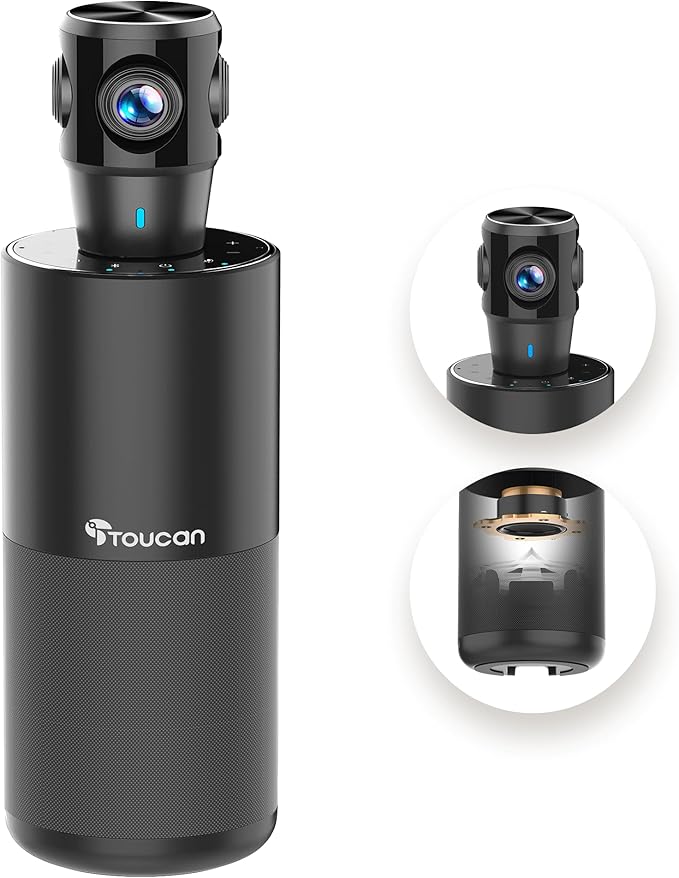Asking where are you from in Italian? is essential in any conversation, and If you have ever been to Italy or made Italian friends the number one question you might get asked is “Where are you from?”.
To ask where are you from In Italian? is by saying “Di dove sei?” which literally means “From where are you?” or you can say “Da dove vieni?” which literally means “From where did you come?” but both questions are translated to “Where are you from?“
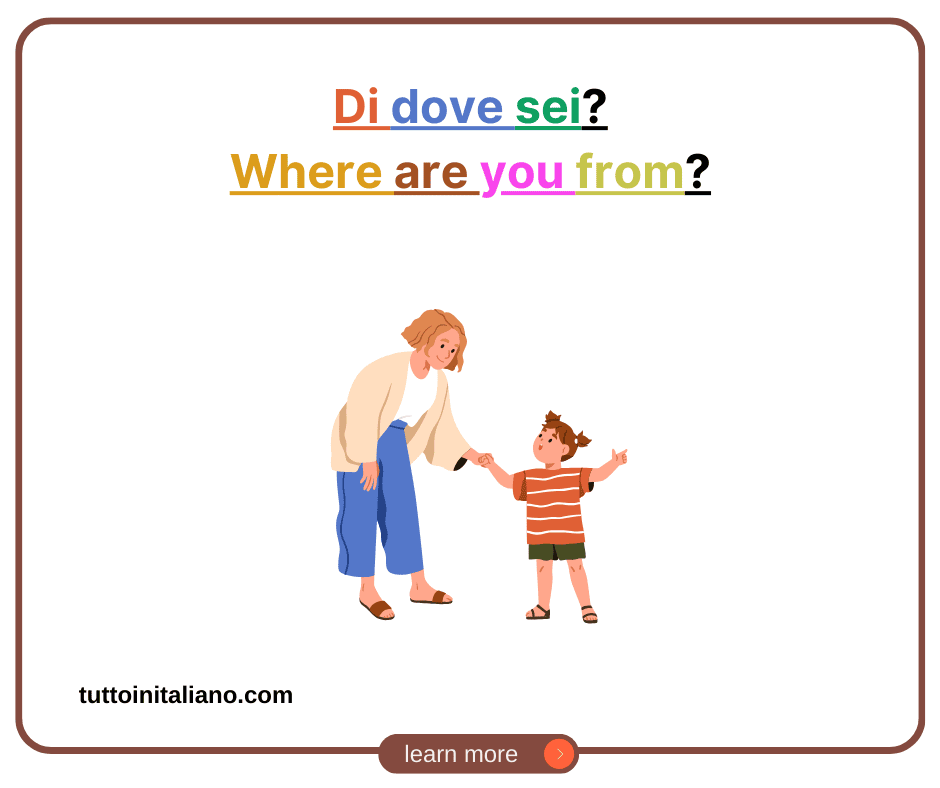
Where are you from in Italian? (Formal)
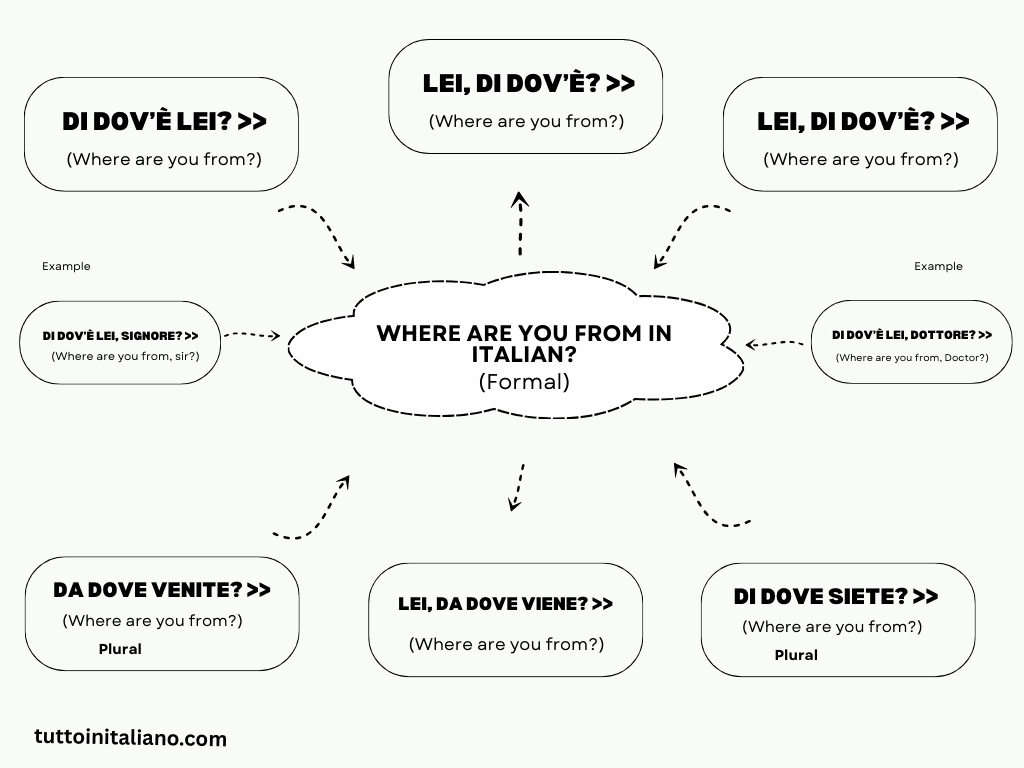
The formal speech in Italian is used with people we don’t know or people we have to respect like older people, police, teachers, doctors, professors, etc, and to ask Where are you from in Italian politely is:
- Di dov’è Lei? >> (Where are you from?)
- Lei, Di dov’è? >> (Where are you from?)
- Da Dove viene? >> (Where are you from?)
- Lei, Da dove viene? >> (Where are you from?)
- Di dove siete? >> (Where are you from?) Plural
- Da dove venite? >> (Where are you from?) Plural
For example.
- Di dov’è Lei, Signore? >> (Where are you from, sir?)
- Di dov’è Lei, Dottore? >> (Where are you from, Doctor?)
- Da dove viene, Signor Alberto? >> (Where are you from, Mr. Alberto?)
- Da dove viene, Signora? >> (Where are you from, Madam?)
Amazon Ads
Where are you from in Italian? (Informal)
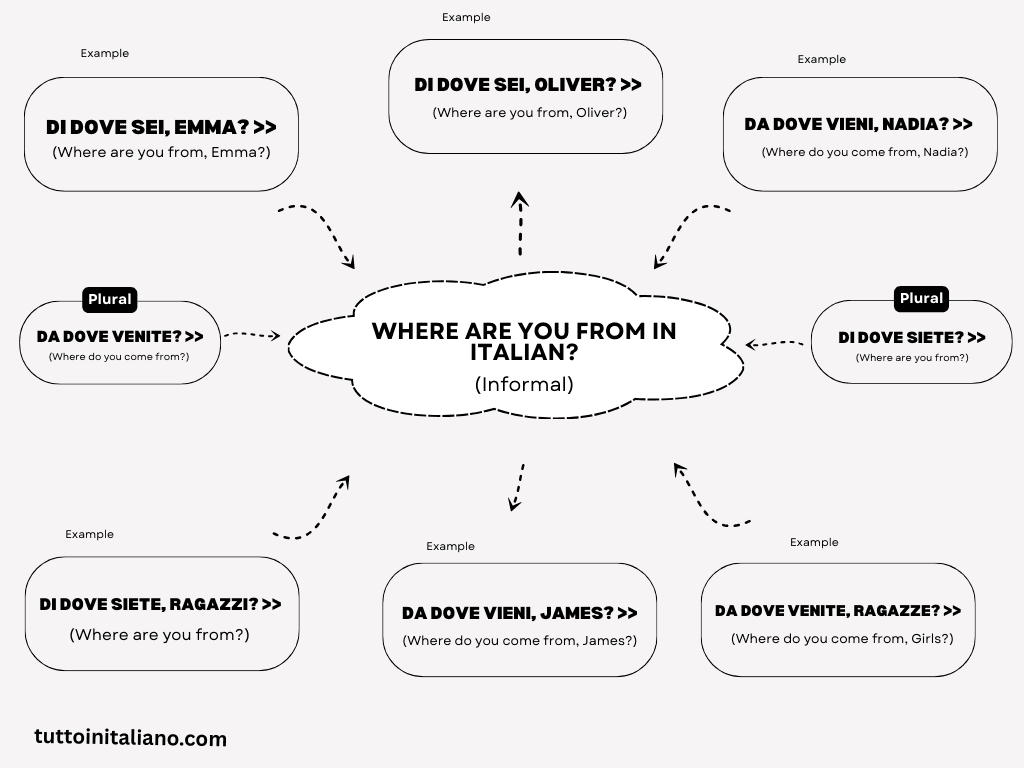
The informal speech is used when the person you are talking to is the same age as you or a friend, and to ask, Where are you from in Italian is:
- Di dove sei? >> (Where are you from?)
- Da dove vieni? >> (Where do you come from?)
- Di dove siete? >> (Where are you from?) Plural
- Da dove venite? >> (Where do you come from?) Plural
For example:
- Di dove sei, Emma? >> (Where are you from, Emma?)
- Di dove sei, Oliver? >> (Where are you from, Oliver?)
- Da Dove vieni, Nadia? >> (Where do you come from, Nadia?)
- Da Dove vieni, James? >> (Where do you come from, James?)
- Di dove siete, Ragazzi? >> (Where do you come from, Guys?)
- Da dove venite, Ragazze? >> (Where do you come from, Girls?)
What is the difference between: “Di dove sei?” and “Da dove vieni?”
The difference between “Di dove sei?” and “Da dove vieni?” is the main verb that forms each question.
The main verb of the question “Di dove sei?” is the verb “Essere >> to be“, and in “Da dove vieni?” is “Venire >> To come“
“Dove” in both questions means “Where” and “Di / Da” in both questions means “From“.
But why does each question take a different preposition if they both have the same meaning? In Italian, some verbs take a specific preposition to form a new meaning for the verb.
- Essere >> to be / Essere di >> to be from
- Venire >> to come / Venire da >> to come from.
Now let’s see the conjugation of these two verbs in The present tense:
| Essere>> to be | Venire>> to come |
| Sono I’m | Vengo I come |
| Sei You are | Vieni You come |
| È He is She is | Viene He comes She comes |
| Siamo We are | Veniamo We come |
| Siete You are | Venite You come |
| Sono They are | Vengono They come |
Examples with (Essere):
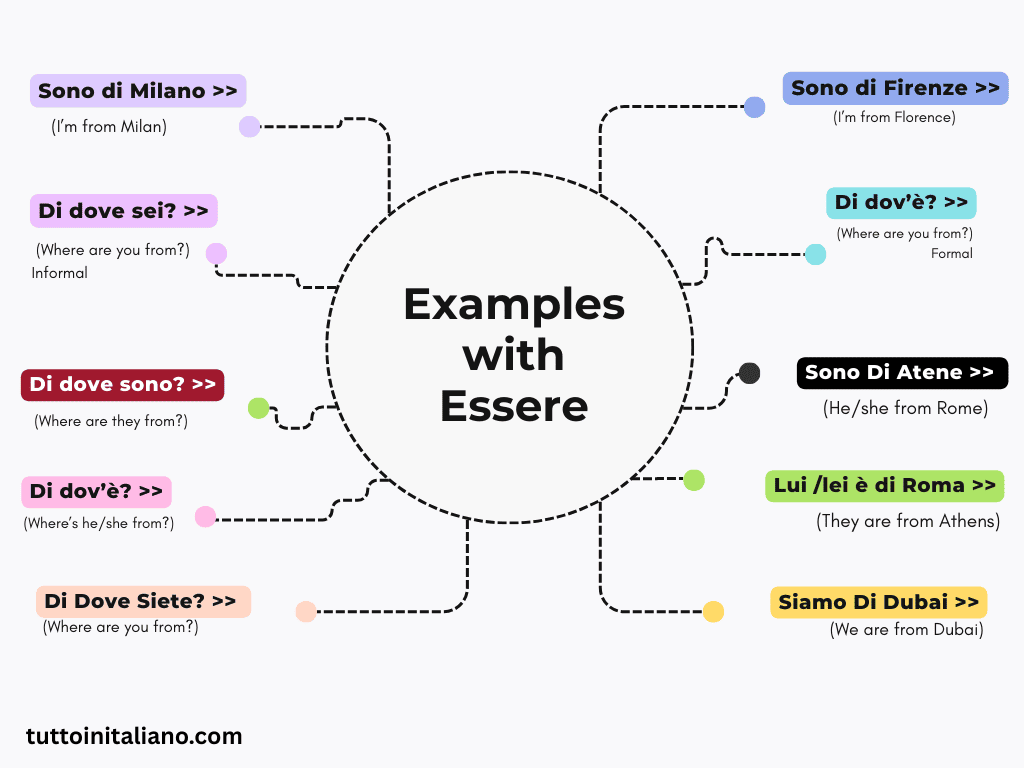
- Di dove sei? >> (Where are you from?) Informal
- Sono di Milano >> (I’m from Milan)
- Di dov’è? >> (Where are you from?) Formal
- Sono di Firenze >> (I’m from Florence)
- Di dov’è? >> (Where’s he/she from?)
- Lui /lei è di Roma >> (He/she from Rome)
- Di dove Siete? >> (Where are you from?)
- Siamo di Dubai >> (We are from Dubai)
- Di dove sono? >> (Where are they from?)
- Sono di Atene >> (They are from Athens)
Examples with (Venire):
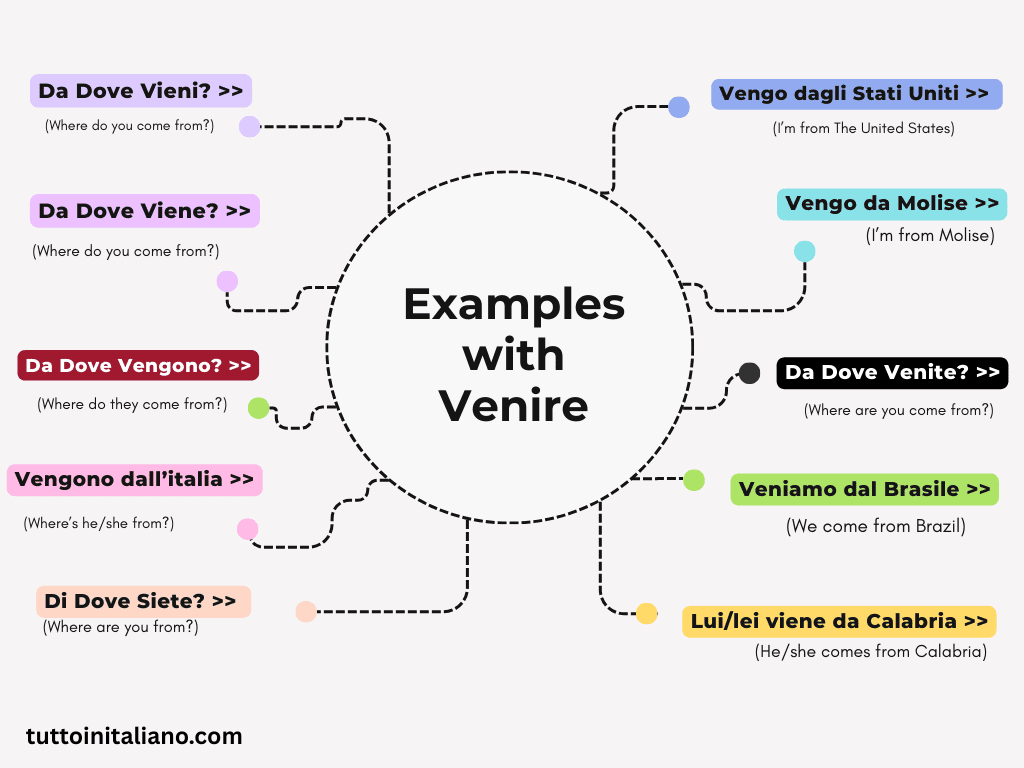
- Da dove Vieni? >> (Where do you come from?)
- Vengo dagli Stati Uniti >> (I’m from The United States)
- Da dove Viene? >> (Where do you come from?)
- Vengo da Molise >> (I’m from Molise)
- Da dove Viene? >> (Where is he/she come from?)
- Lui/lei viene da Calabria >> (He/she comes from Calabria)
- Da dove Venite? >> (Where are you come from?)
- Veniamo dal Brasile >> (We come from Brazil)
- Da dove Vengono? >> (Where do they come from?)
- Vengono dall’italia >> (They come from Italy)
How to answer: Where are you from in Italian? “Di dove sei?”
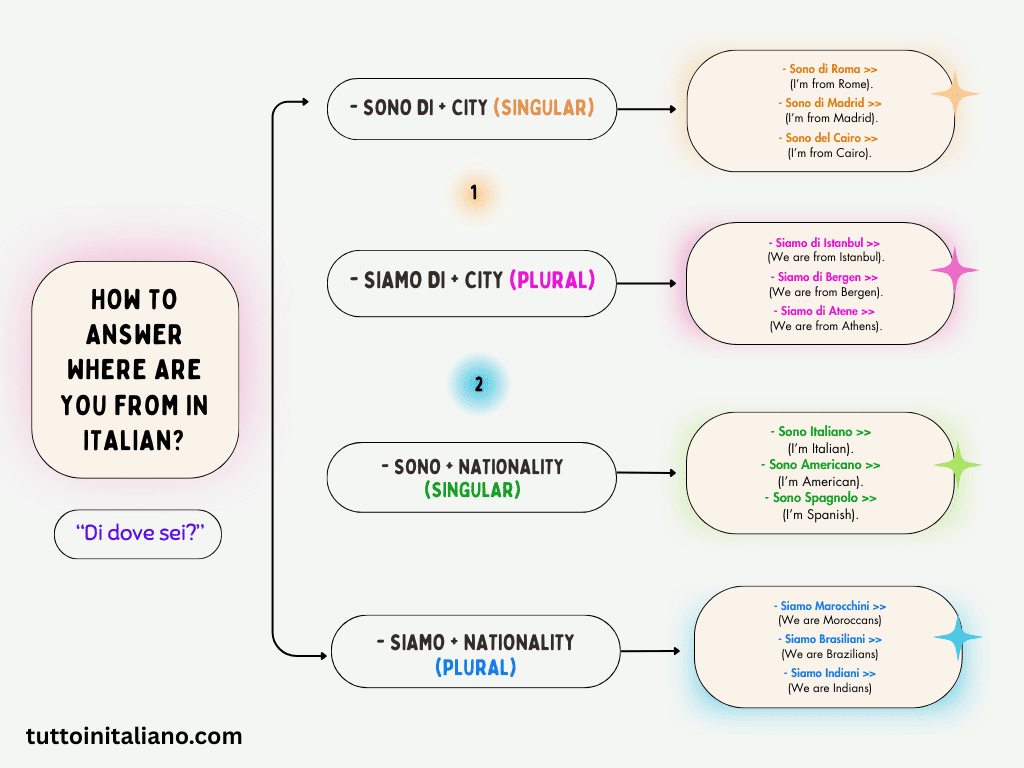
To answer the question “Di dove sei?” Or “Di dov’è?” is:
1).
- Sono di + City (Singular)
- Siamo di + City (Plural)
For example
- Sono di Roma >> (I’m from Rome)
- Sono di New york >> (I’m from New york)
- Sono di Madrid >> (I’m from Madrid)
- Sono del Cairo >> (I’m from Cairo)
- Siamo di Istanbul >> (We are from Istanbul)
- Siamo di Bergen >> (We are from Bergen)
- Siamo di Atene >> (We are from Athens)
* All the cities do not take definite articles except for “Il Cairo”
2).
- Sono + Nationality (Singular)
- Siamo + Nationality (Plural)
For example:
- Sono Italiano >> (I’m Italian)
- Sono Americano >> (I’m American)
- Sono Giapponese >> (I’m Japanese)
- Sono Spagnolo >> (I’m Spanish)
- Siamo Marocchini >> (We are Moroccans)
- Siamo Brasiliani >> (We are Brazilians)
- Siamo Indiani >> (We are Indians)
How to answer: Where are you from in Italian? “Da dove Vieni?”
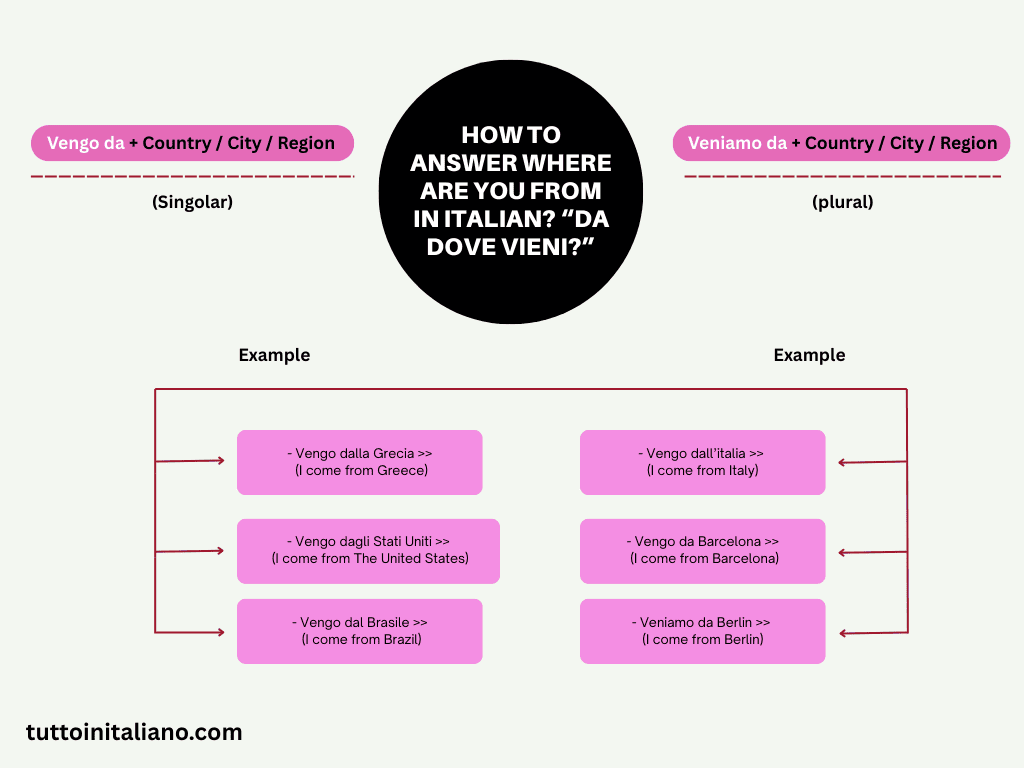
To answer the question “Da dove Vieni?” Or “Da Dove Viene?” is:
- Vengo da + Country / City / Region (Singolar)
- Veniamo da + Country / City / Region (plural)
For example:
- Vengo dalla Grecia >> (I come from Greece)
- Vengo dall’italia >> (I come from Italy)
- Vengo dal Brasile >> (I come from Brazil)
- Vengo dagli Stati Uniti >> (I come from The United States)
- Vengo da Molise >> (I come from Molise)
- Vengo da Barcelona >> (I come from Barcelona)
- Veniamo da Berlin >> (I come from Berlin)
- Veniamo da Nuova Delhi >> (I come from New Delihi)
Amazon Ads
Other ways to ask and answer: Where are you from in Italian?
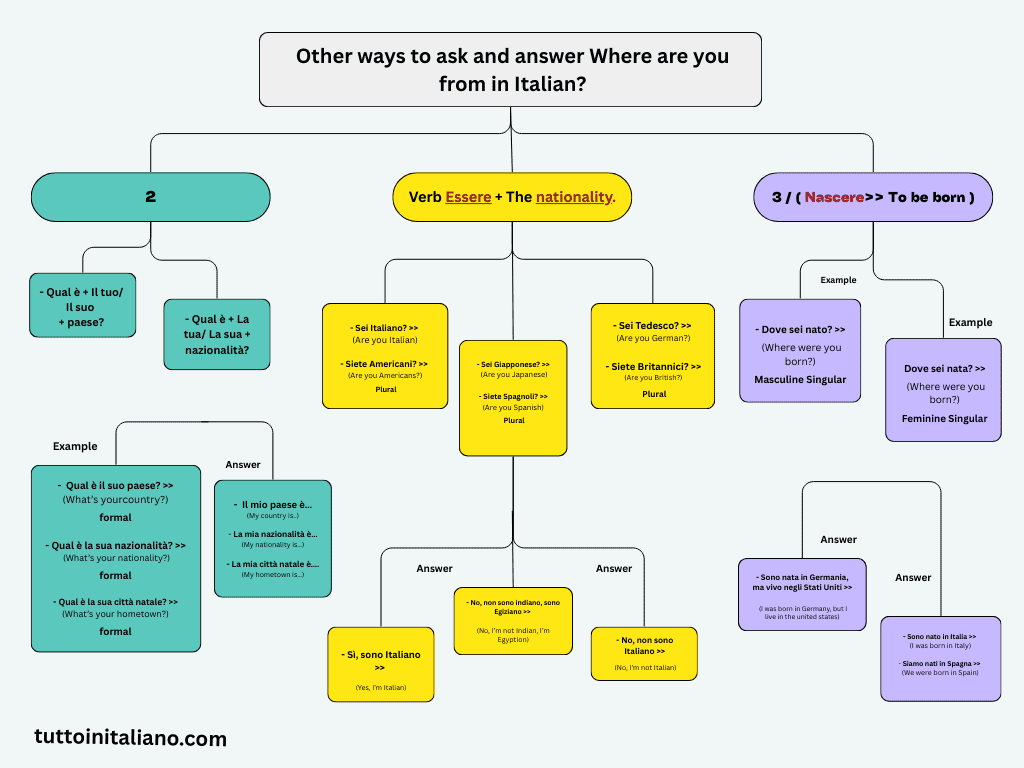
You can ask where are you from in Italian by using this form:
1).
Verb Essere + The nationality.
- Sei Italiano? >> (Are you Italian)
- Sei Giapponese? >> (Are you Japanese)
- Sei Tedesco? >> (Are you German?)
- Siete Americani? >> (Are you Americans?) Plural
- Siete Spagnoli? >> (Are you Spanish?) Plural
- Siete Britannici? >> (Are you British?) Plural
The answer:
- Sì, sono Italiano >> (Yes, I’m Italian)
- No, non sono Italiano >> (No, I’m not Italian)
- No, non sono indiano, sono Egiziano >> (No, I’m not Indian, I’m Egyption)
2).
- Qual è + il tuo/ il suo + paese?
- Qual è + la tua/ la sua + nazionalità?
For example:
- Qual è il tuo paese?>> (What’s your country?) Informal
- Qual è il suo paese? >> (What’s your country?) Formal
- Qual è la tua nazionalità? >> (What’s your nationality?) Informal
- Qual è la sua nazionalità? >> (What’s your nationality?) Formal
- Qual è la tua città natale? >> (What’s your hometown? Iinformal
- Qual è la sua città natale? >> (What’s your hometown?) Formal
The answer
- Il mio paese è… (My country is..)
- La mia nazionalità è… (My nationality is…)
- La mia città natale è…. (My hometown is…)
3).
You can use the verb (Nascere >> To be born) in the past to ask about the place of birth.
- Dove sei nato? >> (Where were you born?) Masculine Singular
- Dove sei nata? >> (Where were you born?) Feminine Singular
- Dove siete nati? >> (Where were you born?) Masculine Plural
- Dove siete nate? >> (Where were you born?) Feminine Plural
The answer
Verb Nascere in the present perfect + in + country name
- Sono nato in Italia >> (I was born in Italy)
- Sono nata in Germania, ma vivo negli Stati Uniti >> (I was born in Germany, but I live in the United States)
- Siamo nati in Spagna >> (We were born in Spain)
- Siamo nate in Brasile >> (We were born in Brazil)





